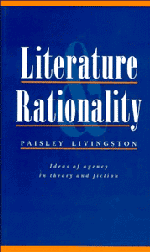4 - Agent's rationality
from II - TEXTUAL MODELS
Published online by Cambridge University Press: 16 October 2009
Summary
Theodore Dreiser's novel, Sister Carrie (first published in 1900), offers a valuable occasion for reflecting on models of rationality and irrationality, particularly by virtue of its complex depiction of a character named Hurstwood. Of particular interest is the narration of the episode relating this figure's robbery and flight to Montreal, and it is aspects of this episode that figure at the centre of my selective analysis of the text in this chapter. As I have stated above, my aim in turning to this and other literary texts in the present study is to explore issues in the theory of rationality, not to contribute to a hermeneutic understanding of an artist's life and works, or to an aesthetical evaluation of literary documents. My oriented and selective discussion of aspects of the text, then, will be followed by an assessment of some of its implications for contemporary hypotheses about rationality.
I shall begin with a discussion of a passage that is justly famous for its enigmatic and thought-provoking depiction of the break-down of intentional control. Hurstwood, it may be recalled, is the middle-aged manager of a bar catering to a middle- and upper-middle-class clientele. The narrator has introduced him to us as ‘an interesting character after his kind’, adding that Hurstwood is ‘shrewd and clever in many little things’. He has risen to his managerial position ‘by perseverance and industry, through long years of service’ (p. 43). Always fastidious in his dress, Hurstwood enjoys extending affable greetings to the establishment's distinguished customers.
- Type
- Chapter
- Information
- Literature and RationalityIdeas of Agency in Theory and Fiction, pp. 123 - 149Publisher: Cambridge University PressPrint publication year: 1991



